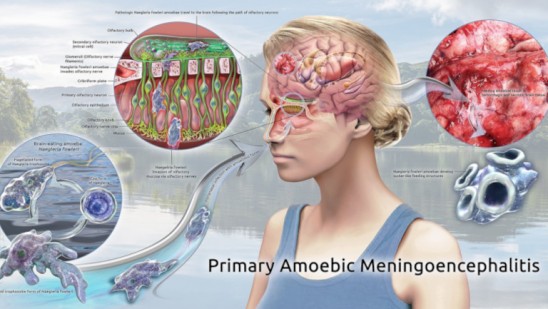A rare case of a brain infection caused by a free-living amoeba found in contaminated waters has been reported in Alappuzha, a coastal district in Kerala, India. The infection, known as primary amoebic meningoencephalitis, has affected a 15-year-old resident of Alappuzha, as stated in a recent government release. This is the second documented case of the disease in the Alappuzha municipality area, with the previous case dating back six years.
Details of the Infection
Primary amoebic meningoencephalitis (PAM) is a rare and potentially fatal infection that affects the brain. It is caused by Naegleria Fowleri, a free-living amoeba commonly found in warm freshwater bodies such as lakes, rivers, and hot springs. Infections typically occur when contaminated water enters the nasal passages during activities like swimming or diving.
The Current Case
According to the government release, a 15-year-old individual from Alappuzha has been diagnosed with primary amoebic meningoencephalitis. The specific details of the infection, including the source of contaminated water, are yet to be determined. The patient's condition is being closely monitored, and appropriate medical interventions are being administered to treat the infection.
Past Incidence
This recent case follows a previous occurrence of primary amoebic meningoencephalitis in the Alappuzha municipality area six years ago. Such incidents are extremely rare, and the emergence of this infection in the region has raised concerns among healthcare authorities and the local community.
Preventive Measures and Awareness
To minimize the risk of amoebic infections, health officials stated the importance of following preventive measures which include avoiding activities that involve the entry of water into the nasal passages, such as diving or jumping into warm freshwater bodies. Additionally, maintaining cleanliness and sanitation of water sources and proper chlorination can help reduce the presence of amoebae in contaminated waters.
The recent case of primary amoebic meningoencephalitis in Alappuzha highlights the need for vigilance and awareness regarding waterborne infections. Healthcare authorities are actively working to manage and treat the infection while promoting preventive measures within the community. Continued efforts in education, water safety, and timely medical intervention are crucial to mitigate the risks associated with rare amoebic infections and ensure the well-being of individuals in the region

 Primary amoebic meningoencephalitis (PAM) is a rare and potentially fatal infection that affects the brain. It is caused by Naegleria Fowleri, a free-living amoeba commonly found in warm freshwater bodies such as lakes, rivers, and hot springs. The recent case of primary amoebic meningoencephalitis in Alappuzha highlights the need for vigilance and awareness regarding waterborne infections
Primary amoebic meningoencephalitis (PAM) is a rare and potentially fatal infection that affects the brain. It is caused by Naegleria Fowleri, a free-living amoeba commonly found in warm freshwater bodies such as lakes, rivers, and hot springs. The recent case of primary amoebic meningoencephalitis in Alappuzha highlights the need for vigilance and awareness regarding waterborne infections










.jpeg)

.jpg)


















.jpg)